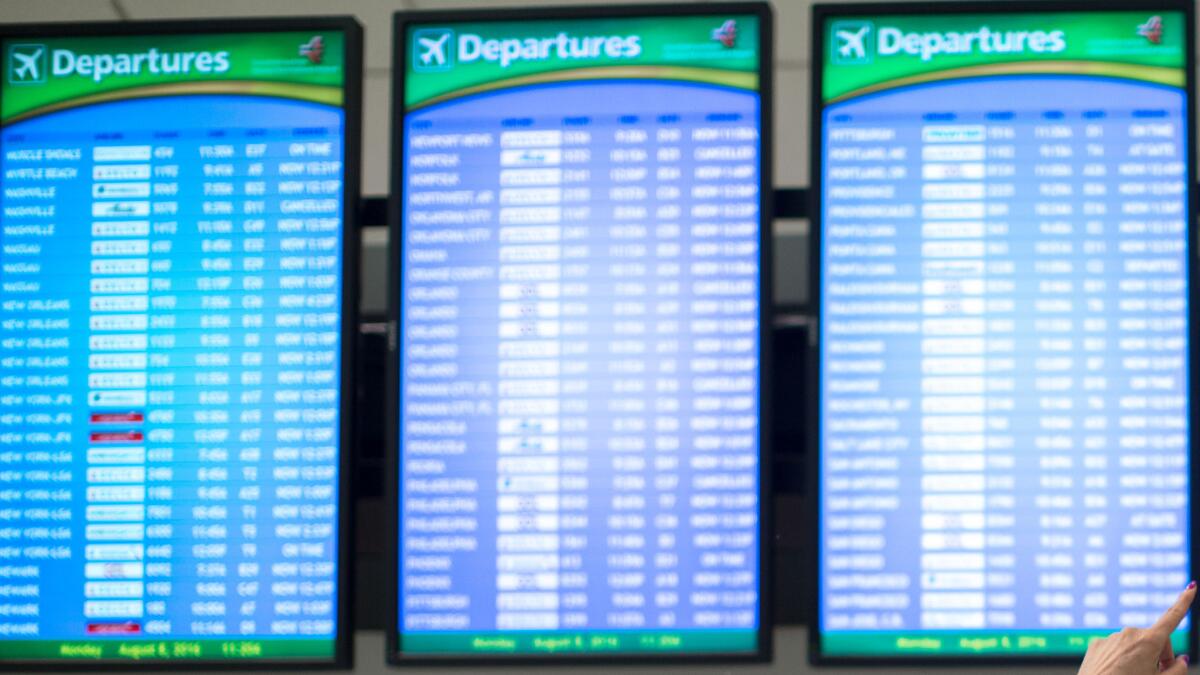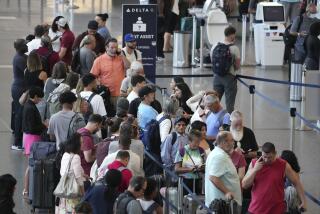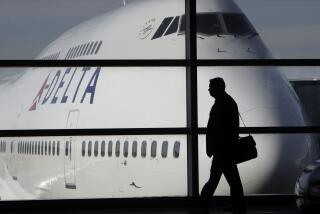How to cope when airlines’ computer systems are down and travel is messed up

The airlines have suffered so many computer outages in the last few years — including Delta’s on Monday — they are hardly news anymore.
But if you’re caught in the mess that’s created, they are news — bad news.
Whether they’re caused by electrical failures outside the airlines’ control or by computer systems with inadequate recovery or backup capabilities, you’ll need coping strategies to survive.
Here are some:
►You can cancel your trip without penalty. Passengers can ask for a refund, even on a non-refundable airfare, if a flight is canceled or severely delayed. “Severe” varies from airline to airline but generally a two-hour delay qualifies.
►If you bought travel insurance, you may be covered for inconveniences. Not every policy will cover electrical outages or computer system shutdowns, but some do. Most common: coverage for trip delays if you need meals or a hotel room or other reasonable expenses, and costs associated with getting to your destination.
Less likely to be covered under these circumstances: cancellation penalties for hotel rooms, tours, cruises at your destination. Insurers AXA Assistance USA and Tin Leg said they would cover the latest Delta snafu because an airline computer outage falls under the policy definition of “mechanical breakdown of the common carrier,” travel insurance aggregator Squaremouth said.
►If you have credit card coverage, you may have delay protection. Some credit cards, notably those issued by Chase for United and Sapphire and some upper-tier Citibank American Airlines cards, offer trip delay protection (typically up to $500 for meals, hotels, etc.) for “equipment failure,” but whether this means aircraft or computer equipment is open to interpretation. You must have charged your trip with the credit card, of course.
►If you’re flying to or from Europe, you may be covered by European Union rules. Depending on whether the outage was deemed to be within the airline’s control (electrical outages probably not, computer system meltdowns probably yes), European Union law provides cash compensation for delays and interrupted trips and also mandates that airlines provide meals and hotels to stranded passengers.
If you’re flying from the European Union on any airline, you’re covered; if you’re flying to the EU on any EU-based airline, you’re also covered.
Even if you bought a fare on, say, Delta to Italy but Alitalia operated the flight in a code-share arrangement, you’re still covered, no matter that the selling airline was an American carrier, according to Cecilia Minges, spokesperson for Airhelp, which for a fee will help you collect your compensation.
►If you’re stuck on the runway or tarmac, Department of Transportation rules may kick in. Its regulations state that you can request to be deplaned if the delay stretches past three hours on a domestic flight or four hours on an international trip. Airlines can be fined for refusing to do so unless the crew cites a safety reason.
►You can ask to be put on another airline if a flight on your original airline isn’t looking hopeful. Years ago, airlines were required to do this for free, even paying for first class if economy class was full. No longer, but you can still ask to be endorsed over to a competing airline. The greater your status in the frequent-flier program, the more likely the airline will take care of you.
Some veteran agents still understand “Can you Rule 240 me?” but that doesn’t always fly.
►Get thee to the airline’s lounge. Even if you’re not a member, this is the perfect time to cool your jets in the Delta Skyclub, the American Admirals Club, or the United Club room. Day passes typically cost $50. If you’re going to be stuck for hours, it’s worth it. Also, the lines for rebooking or information will be shorter in these lounges than in the terminals.There are other ways to gain access to lounges, including such programs as Priority Pass and others that may charge an annual fee and then a per-visit fee.
ALSO:
Touring South Africa in the lap of luxury aboard Rovos Rail’s restored train
Try your hand at sand sculpting at Kauai’s Hawaii Sand Festival
More to Read
Sign up for The Wild
We’ll help you find the best places to hike, bike and run, as well as the perfect silent spots for meditation and yoga.
You may occasionally receive promotional content from the Los Angeles Times.






